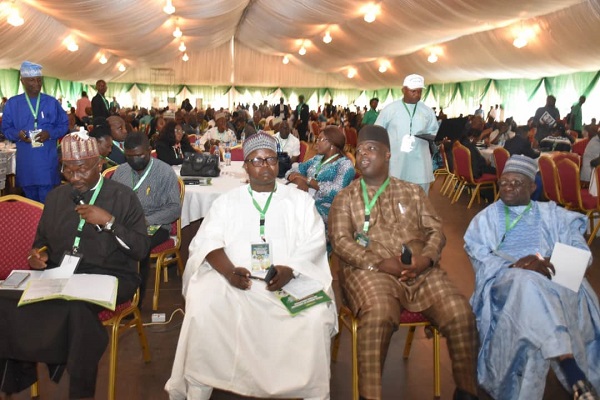
The Federal Ministry of Agriculture and Rural Development (FMARD) said it will collaborate with state governments and other stakeholders to improve the agricultural commodity value chain development in the sector to enhance the livelihood of the smallholder farmers, as well as modify the commodity value chain development processes.
The permanent secretary, Federal Ministry of Agriculture and Rural Development, Dr. Ernest Umakhihe gave this indication at the 45th regular meeting of the National Council on Agriculture and Rural Development (NCARD) which started today (September 13, 2022) in Jos, Plateau, themed “Strengthening Agricultural Value Chains Development Process for Food Security and Economic Development”.
Represented by the director, department of agriculture land and climate change management services, Engr. Shehu Bello, the permanent secretary stated that the agricultural commodity value chain development as a cornerstone and strategic implementation imperatives for the prevailing sectoral policy framework requires a robust discussion and deliberate decisions on intervention models, the next steps for the major subsectors like crop/horticulture production, livestock/ veterinary services, fisheries and aquaculture, as well as agribusiness.
Umakhihe pointed out that the foundation to achieve the desired success is the commitment to the provision of incentives, increasing the output and quality of agricultural commodities to meet and surpass national requirements as well as achieving a diversified economic base with agriculture leading the way for the non-oil sectors of the economy.
The permanent secretary revealed that the ministry through the launch of the National Agricultural Technology Innovation Plan 2022 – 2027 (NATIP) has demonstrated the commitment of the sector to address all conceivable challenges confronting the sector, with a focus on strengthening and developing the agricultural value chain.
“The impact has been enormous. It contributes to food security, increases productivity and efficiency, engenders diversification, generates higher incomes, reduces post-harvest losses and, above all, generates employment opportunities.”
He stated that the ministry would prioritise its efforts of increasing agricultural processing capacity in the country through the establishment of several cottage industries for the production of staple food products in a manner that emphasizes their competitive and comparative advantage.
Umakhihe added that it would ensure a steady off-take of produce from out-growers and enhance the income of farmers and entrepreneurs across all commodity value chains.
He further revealed that the technical session was the forerunner to the council meeting and it was dedicated to the exchange of ideas on the agricultural development process in the country to set the tone of issues for deliberation and discussions at the council.
The permanent secretary urged the stakeholders to approach the deliberations with a broad mind, add value to all the issues for the overall impact of the sector on the economy, and proffer concrete and practical suggestions that would assist the council in reaching meaningful decisions.
Earlier in his welcome address, the Plateau State Commissioner of Agriculture and Rural Development, Dr. Hosea Finangwai appealed for the memorandum for the upgrade of the potato station at Kuru to be prioritised on its merit, considering that the state accounts for over 90 per cent of the production [in the nation], livelihood and income of farmers – which were all being threatened by the monstrous potato blight.
In his remarks the director, planning and policy coordination, Alhaji Ibrahim Bello stated that the stakeholders would use the opportunity to share experiences and good practices on value chain development in the agricultural sector as they affect food security and economic development for adoption and replication in the sector.
A statement by the ministry’s director of information signed by Ikemefuna Ezeaja, said permanent secretaries of state ministries of agriculture, livestock and rural development; heads of parastatals, agencies, institutes, universities and colleges under the FMARD, as well as stakeholders were present.


